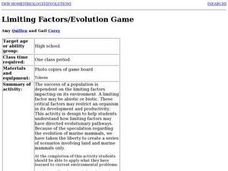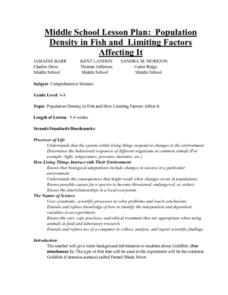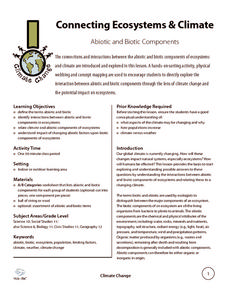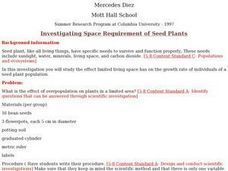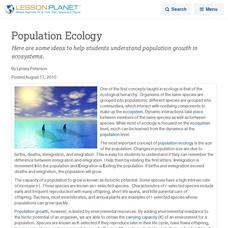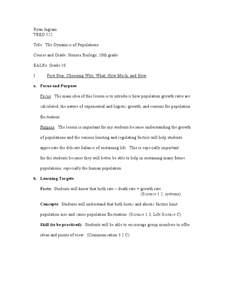Curated OER
Population Biology
Young scholars define the following terms: predation, competition, carrying capacity and population. They can explain the patterns of growth and the limitations of growth. Students explain the difference between density-dependent and...
Prince William Network
Migration Headache
During this game, kids become migratory shorebirds and fly among wintering, nesting, and stopover habitats. If they do not arrive at a suitable habitat on time, they do not survive. Catastrophic events are periodically introduced that...
Teach Engineering
Computer Simulation of the Sonoran Desert Community
See how changes in initial populations and parameters affect a biological community. Individuals use a special software program to simulate a desert community with five species. They adjust initial populations to see how the community...
Curated OER
Factors That Affect Populations
In this population worksheet, students will brainstorm 6 different factors that can affect an organism's population. Students will write down their ideas in this graphic organizer.
Curated OER
Population Dynamics
Students watch a video on population dynamics. They conduct an experiment where they fill up a designated space with students. They recreate multiplying rabbits using beans.
Curated OER
Limiting Factors/ Evolution Game
Students will understand the relationship between limiting factors and evolution. They will be able to hypothesize possible evolutionary pathways for modern day organisms.
Curated OER
Population Density In Fish
Students investigate how a population of fish multiplies in an ecosystem and the kinds of things that must be done to maintain a healthy population balance with other organisms that live there. They conduct an experiment to test the...
Wild BC
Connecting Ecosystems & Climate
Collaborators sort a set of cards into biotic and abiotic categories. Then, as a class, they discuss their work and relate each of the abiotic components to climate change. Finally, they form a web of components by connecting those that...
Curated OER
Sample Midyear Examination (Chemistry and Biology)
A 12-page midterm exam sample can be given to young scientists in preparation for an exam. This particular installment is geared toward a class that delves into both ecology and chemistry concepts. There is no way to separate the 50...
Curated OER
Population Biology Case Study
Students are focused on the big question: What makes a population grow and how could that growth stop? They use these concepts to help answer the big question: carry capacity, density dependent v. density, independent factors, predation...
Curated OER
Population Biology
In this population activity, students will compare two population growth graphs and complete four short answer questions. Then students will investigate the factors that influence population growth in 8 fill in the blank statements and 4...
Curated OER
Investigating Space Requirement of Seed Plants
Students use scientific methods to investigate the effects of overpopulation of seed plants on growth in a limited living space. Students relate seed plant population findings to that of other organisms.
Alabama Wildlife Federation
Big Fish, Little Fish
Tag, you're eaten! A instructional activity on predator-prey relationships uses the game freeze tag as a model. Learners become either a predator or prey and play a game of tag as the prey tries to reach areas that house food and...
Curated OER
Some Similarities Between the Spread of an Infectious Disease and Population Growth
Learners compare and contrast the spread of infectious diseases and population growth. In this biology lesson plan, students identify the exponential growth pattern of spreading diseases. They relate this to HIV infection and AIDS.
Curated OER
Communities and Biomes
In this communities worksheet, high schoolers will look at the interactions between biotic and abiotic factors and the effect these factors have on organism populations. Students will also order the succession steps that occur over time...
Curated OER
Changes in Ecosystems
In this changes in ecosystems activity, students complete 21 various types of questions related to ecosystem. First, they determine whether each statement is true or false based on vocabulary. Then, students determine whether natural...
Curated OER
Population Ecology
Here are some ideas to help students understand population growth in ecosystems.
Curated OER
Flowering Phenology: How Do Plants Know When To Flower?
Students explore the biotic and abiotic factors that affect plant reproduction and the potential consequences of human activities on plant populations. The effects of urbanization are discussed as an influence in the consequences.
Curated OER
Niches and Adaptations
Students present information about a species, its niche, and adaptations. In this lesson on animal environments, students explore how surroundings can affect a given population resulting in adaptation.
Population Connection
Where Do We Grow from Here?
Did you know that the population is expected to grow to 11 billion by 2100? The resource serves final installment in a six-part series on the global population and its effects. Scholars interpret data from the United Nations about the...
Curated OER
Relationships Among Living Things
In this living things worksheet, students review terms and concepts about the different relationships between living things. This worksheet has 7 true or false and 5 short answer questions.
Curated OER
Community Distribution
In this community distribution worksheet, students will review 5 terms associated with biomes, ecosystems, and communities. Students will then match 11 terms as either relating to marine biomes or land biomes. This worksheet has 5 fill...
Statistics Education Web
Who Sends the Most Text Messages?
The way you use statistics can tell different stories about the same set of data. Here, learners use sets of data to determine which person sends the most text messages. They use random sampling to collect their data and calculate a...
Curated OER
The Dynamics of Populations
Tenth graders analyze the growth rate of different population. In this biology experiment, 10th graders identify the biotic and abiotic factors that limit population size. They create a poster to show their findings in class.







